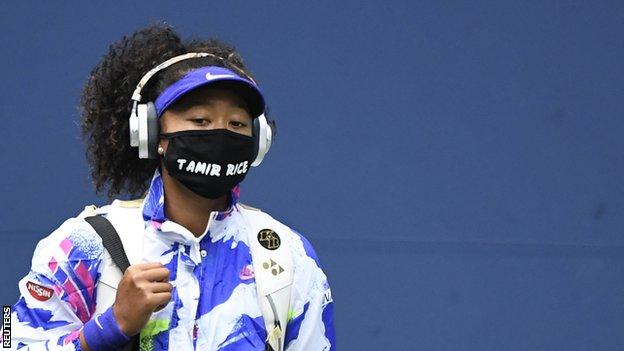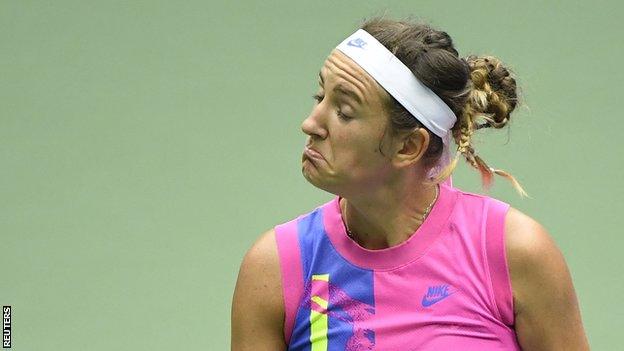

Naomi Osaka demonstrated her growing maturity to fight back against Victoria Azarenka in a compelling US Open final and claim her third Grand Slam title.
Japanese fourth seed Osaka, 22, won 1-6 6-3 6-3 for her second US Open title.
Belarusian Azarenka, in her first major final since 2013, was broken for 5-3 in the decider before Osaka served out.
Osaka shrieked with joy as she took her second match point, then calmly lay on the court and stared at the New York sky as she contemplated her latest achievement.
Osaka’s level raised considerably as 31-year-old Azarenka was unable to maintain the intensity she showed in a one-sided opening set.
The fightback ensured Osaka, who won the 2018 US Open and 2019 Australian Open, maintained her record of winning every Grand Slam final she has played in.
“I don’t want to play you in any more finals, I didn’t really enjoy that, it was a really tough match for me,” Osaka jokingly told Azarenka.
She added: “It was really inspiring for me because I used to watch you play here when I was younger. I learned a lot, so thank you.”
Osaka’s maiden victory at Flushing Meadows two years ago came in straight sets against Serena Williams in a hostile environment following the American’s infamous argument with umpire Carlos Ramos.
It left Osaka in tears as she stood on the podium waiting to collect her first Grand Slam trophy.
This second success could not have been more different.
Here she had to fight back from a set down against an inspired Azarenka – and navigate a tricky decider which could have swung either way – on an Arthur Ashe Stadium left virtually empty because of the coronavirus pandemic.
And even in what were still strange circumstances, Osaka could this time enjoy the moment with a beaming smile as she lifted the prize in the company of her team and rapper boyfriend Cordae – even if she’d had to take the trophy from the table herself rather than be presented with it because of social distancing rules.
Osaka looked a little lost as Azarenka overwhelmed her in a fast start, hitting 13 unforced errors and struggling to cope with the Belarusian’s proactive play and controlled aggression.
Draping a towel over her head at changeovers was a sign of Osaka’s concerns. Her attempts to collect her thoughts and regain her composure did not initially work, however.
Another wayward forehand prompted a frustrated Osaka to throw her racquet to the floor in disgust.
Eventually, though, the mental resilience which she says she has developed over recent months came to the fore.
“I just thought it would be embarrassing to lose this under an hour,” said Osaka, who will rise to third in the world after her win.
That resulted in a major momentum shift in her favour as Azarenka threatened to move 3-0 ahead in the second set.
A rasping forehand by Osaka at 40-30 proved pivotal, not only in the game, but ultimately in the whole match as she seized control to level.
The former world number one maintained that level in the decider to earn a 4-1 lead, but was unable to convert one of four break points to move 5-1 ahead.
That might have proved costly when Azarenka immediately put the set back on serve, only for Osaka to battle back again by winning what proved to be the final two games.
Not only has Osaka impressed on court during the Cincinnati Masters-US Open bubble in the past month, she has also won many admirers for her activism in the fight against racism and police brutality in the United States.
A few days before the start of the US Open, Osaka pulled out of her Western and Southern Open semi-final in protest at the shooting of Jacob Blake, a black man, by police in Wisconsin.
Before her US Open first-round match, she wore a face mask with the name of Breonna Taylor, a black woman who was shot dead by a policeman in March.
Osaka, who has Japanese and Haitian parents, and was brought up in the United States, said she had seven masks with seven different names.

Her target was to reveal all of them by reaching Saturday’s final and that provided her with extra motivation to win the title, according to her coach Wim Fissette.
“I felt the point was to make people start talking,” Osaka said after her victory.
“I’ve been inside the bubble and not sure what’s going on in the outside world. The more retweets it gets, the more people talk about it.”
Former world number one Azarenka was aiming to complete a remarkable renaissance by landing her first Grand Slam title since defending her Australian Open crown in 2013.
Few had predicted she would compete for the sport’s biggest prizes again after a turbulent past few years.
Azarenka took time away from the sport to give birth in December 2016 and had her comeback stalled by a lengthy custody battle over son Leo.
Last week she admitted she had thought about quitting when the WTA Tour was suspended because of the coronavirus pandemic.

She had won only one match in the previous year going into last month’s restart, but came back from the enforced break reinvigorated and possessing a fresh perceptive on life.
That enabled her to win a first WTA title in four years when Osaka pulled out of their scheduled Western & Southern Open final with a hamstring injury – and she continued her form in the Grand Slam.
Ultimately though, she could not become the fourth mother to win a major title as Osaka consigned her to a third defeat in a US Open final.
BBC tennis correspondent Russell Fuller
When Osaka won the title two years ago, boos rang around the Arthur Ashe Stadium as Serena Williams had been docked a game.
This time virtual silence greeted her triumph – but again she had to do it the hard way.
Azarenka played an almost flawless first set, and it was only when four games from defeat that Osaka found her range and some serious power.
The 22-year-old has taken some knocks over the past 18 months as she came to terms with life as one of the world’s highest profile athletes.
A first-round defeat at last year’s Wimbledon was perhaps the hardest to take – but look at her now.
Not only is she playing with supreme confidence once again, but is also able to use her influence to promote social justice in a very assured and unassuming way. – bbc.com